Jay Reatard - Interview
by Sarah Mwangi
published: 24 / 11 / 2008
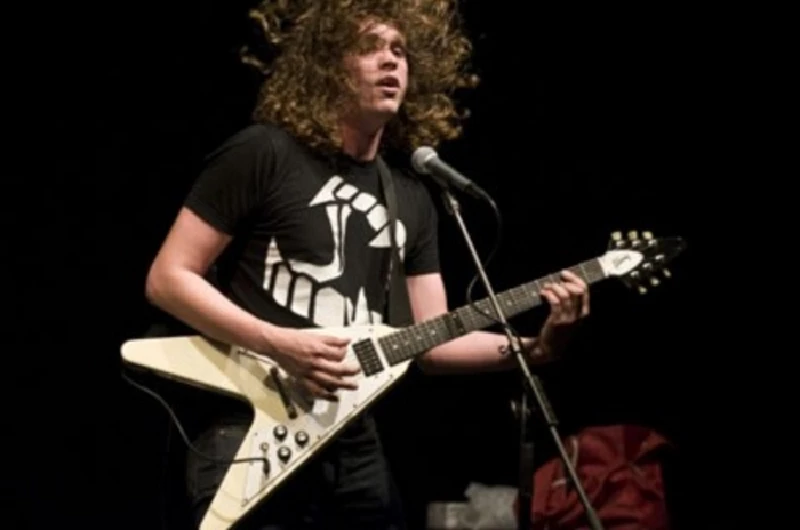
intro
Jay Reatard is the former front man with the Reatards and dozens of other punk bands. He chats to Sarah Mwangi about his recent decision to turn solo, and the problems he has had dealing with violence at his gigs
“At this moment, and for the past year and a half, I’ve felt like the situation I have right now is the best I've ever been,” muses Jay Reatard seated in a dark corner of the Nottingham Bodega before he plays a gig there. “I can record stuff on my own and just play it out with a band. So as long as it seems to be going well I don’t see any reasons to do anything else.” Born Jay Lindsey, he adopted the moniker ‘Reatard’ when he formed garage punk band, the Reatards in the late 1990s, after being inspired by seeing the Oblivians live. And from what he saw that night, he fashioned a successful underground career with his unique D.I.Y. punk attitude. Since his first single with the Reatards in 1998 on Obilivian’s frontman, Eric Friedl’s Goner Records, he has formed several punk bands, including the Bad Times with Eric Friedl, the Lost Sounds, the Final Solutions and Angry Angles, sometimes being an active member in more than one of these bands at the same time. Ten years later, he finds himself without the company of band mates, sitting alone on a brown leather sofa with torn and frayed cushions. I talk to him about this new venture, his new album and his current media image. PB : So after being around a group of musicians for most of your career, what was the whole concept of going solo ? J : The whole idea behind doing a solo band was that I was trying to take an aspect that I liked the most from each project that I had before and to incorporate them into one sound. If anything, those projects were more like exercises to get to the point to where I am now. PB : There has been a steady rise in your media profile since your first solo effort, ‘Blood Vision’. You were even listed as Number 25 on NME’s Cool List... J : Yeah, whatever that thing is, right (chuckles). I think it’s hilarious and that it’s irrelevant. But I think that if you write a magazine where you have to write 80 pages of shit a week, you just have to make things up, you know. PB : Despite that, do you find that there are limitations of being a solo artist ? J : Yeah, there are limitations. Sometimes you lose perspective and it’s incredibly frustrating when you can’t rely on someone else to help you write a part or work out something. I do kind of miss working with other people. It’s kind of fun to bounce ideas off other people. I really miss that process. But there’s also no compromising. There are pros and cons I suppose because sometimes compromising your songs when you’re trying to write with someone else can fuck your songs up more than it can help. You have to take 100 per cent responsibility for whatever happens. If something’s not so good, you really can’t blame anyone. It’s a lot more of a risk as far as you’re investing so much. If reviews come out and people don’t like it and the label doesn’t like it well everything comes back to you. PB : You’ve also moved from small-time record labels to indie giant Matador Record. Why did you decide to move ? J : I’ve just been doing things the same way for 12 years, so I figured why not try and do something differently. PB : Have you noticed any differences between the other labels you’ve been on and Matador? J : The main difference is it’s less a personal process which is odd for someone like me who’s used to being like best friends with the people he puts out records with. But your best friends can only sell records to so many people before you get to a glass ceiling. Matador have the ability to promote a record to a different crowd than maybe the labels I was working with could. PB : Your first major project with Matador will be your new album. How is that going? J : I’m done, like 90% done. It hasn’t been as easy as other records because I haven’t had as heavy a tour schedule in my past. I’ve kind of been on the road for 6 months or more out of the year and just been going home and trying to create something a few days at a time. It makes things hard to do something extremely cohesive so I've started over many times and I'm about done now so. It’s been the most frustrating record I’ve ever recorded. PB : Why is that? J : A combination of pressure, lack of time and putting out so many things so quickly. It’s just been challenging. PB : What inspired the new direction in your album ? J : I had a really weird couple of years where I was getting completely hammered everyday and not really living my life how I wanted to. I guess it’s just a bit more introspective, and just more about me. I realised after sobering up, every song I was writing was about other people and how I felt about other people so it’s a little more of a personal record I suppose. PB : And that ties in with your solo project... J : Yeah. PB : In a number of interviews you’ve done this year, you’ve been quoted as saying that your new album is "wimpy" or "wimpier" than your previous material. Why would you say that ? J : When I say that, I’m like gauging it against anything that I've previously done. I guess wimpy is a really de-emasculating word I suppose. I guess it’s just a little bit more calm, a little bit more pop based, a lot more melodic. I don’t know if it’s actually wimpy. I just used an incorrect word I suppose. PB : Are you proud of your work ? J : Oh absolutely, I like what I’m doing. It seems that I always have to keep a bit of self depreciation in my interviews or any time when I speak about my music. I just don’t feel like artists are supposed to enjoy what they are making. It kind of feels like if you’re actually like, “I made the best album ever that I'm ever going to make,” then you should probably stop, because you’ve achieved what you set out to do; to be satisfied. I feel that as long as I'm dissatisfied with what I'm making I’ll continue to keep making more. So maybe I just go into it that way as a process of psyching myself out. I don’t want to become too comfortable. PB : Is it a process to strive to be better? J : Yeah absolutely, even if your fans think you’re moving backwards. As long as you’re convinced that everything you’re doing could be better, there’s a reason to keep waking up and doing it. PB : There has been a lot of buzz about what happens in your gigs. Do you regret the negative actions that happen in your gigs? J : Are you referring specifically to like violence (chuckles)? I always regret that anything like that has to happen. It sucks when one per cent of the people can spoil the time for the rest of the entire room. It’s really unfortunate. It’s just people don’t really understand you spend every waking hour of your life trying to make records. Then you go on tour. Then you sit in the van eight hours a day. You fly 30, 40 times a year in an airplane next to some large uncomfortable people and then you get one hour a day 200 times a year to perform. To have the actions of one person strip that all away that’s... I do regret losing my cool but I guess I take it personally and I take it personally for everybody else in the room if somebody’s doing something stupid that is jeopardising a show. I’m always concerned. It’s not like I’m just going around punching people and grabbing all the money and running out the back door. Yeah, it’s unfortunate. PB : How about your media image ? Are you concerned with that at all? J : I can’t think about that stuff. You don’t have control over it. There’s 3, 000 videos of us on YouTube and there’s one that had someone being punched. So 100, 000 people watched that one and 3, 000 people watched us play a song. I just think that’s what people want, that kind of entertainment. They just want to see the punch and I have no control over that. I feel like if I did have control over people’s perceptions worldwide, what they like to watch and what they like to do and how they think of me, I don’t think that I would even be bothering with making records. I’d probably try to do something like help world peace I suppose. PB : I heard that you had a bad experience here in the UK. I suppose you’ve been able to get past that? J : I’m slowly getting over it, I suppose. I just had a really bad experience. Angry Angles, the band that I was in, previous to this one, kind of imploded here. We got into a fight on the ferry and over seven days of lightly attended shows, bad weather and not being taken care of too well by promoters, we basically decided to break up here. PB : So, how is your experience in the UK now? J : I think people are still really sceptical here. I think that the people who are coming to our shows are like, “Well, I read about it in the 'NME', I watched him punch this person and now, I like the songs but why isn’t he punching people?” Like a guy downstairs, just while I was trying to enjoy a Coca Cola, was definitely trying to get a negative reaction out of me, poking at me and trying to start a fight. Asking me, like you know, "Are you going to be singing tonight or are you gonna fuck shit up?” and I was like, “I don’t know, why don’t you take a risk and see what happens yourself”. I think people here really do like sensationalised media, not so much the music but like something else, like an image or violence. Seems like every interview I’ve done over here was like, all violence. One guy interviewed me about - everything was about violence. I don’t know maybe I’m just as sceptical as the people here. PB : Does it upset you when people are trying to push your buttons? J : No, it’s predictable, it’s boring. I’m just sitting there and like “Is this guy fucking kidding me. Does he not realise that there’s one of him in every place that I go now ?” PB : I guess it’s like if you’re in a TV show and someone keeps on shouting out your catchphrase... J : Yeah, could you imagine... PB : Since you are taking a different direction with your new album, will this translate into your live performances as well ? Or do you consider live performances and studio recordings as different versions of yourself ? J : Oh yeah, absolutely. I consider them almost two separate bands. Like some people really enjoy how it sounds completely different live and some people are really bummed. But it’s supposed to be two different things. I feel like when you’re recording music, you’re creating something. It’s supposed to be really specific to the moment you’re creating and then to recreate it over and over, night after night, the exact same way, to me is like painting something and then xeroxing it and trying to sell everyone the Xerox. It’s not creative. It’s not fun. I think at this point it’s almost like we’re in a cover band. The guys in the band, Steven and Billy, don’t really play on the record too much so, it would almost be like we’re in a cover band, like I’m in cover band of myself or something (chuckles). It just doesn’t work so I just let it take over its own sound. PB : Do you have planned set lists for your tonight at the Bodega ? J : We usually just kind of wing it, I just scream out whatever song feels right at that moment. I think it is better that way. People change every night so I try to play whatever it makes me the most comfortable to play next. Moments later on stage, Lindsey turns into Jay Reatard armed with a flying V guitar and supported by Stephen Pope on bass (flying V, of course) and Billy Hayes on drums. The mild mannered personality that toyed with the stuffing of an old chair, now makes way for the ferocity of a self-raised punk. Not completely buried though, hints of Lindsey can still be seen coyly brushing off the stray strands of curly locks blocking his vision of the stage. But Jay Reatard is the stronger of the two as he powers through the set with screaming lyrics, licks and feedback to an attentive audience. Just like his music, there are two versions of Mr. Jay.
Picture Gallery:-
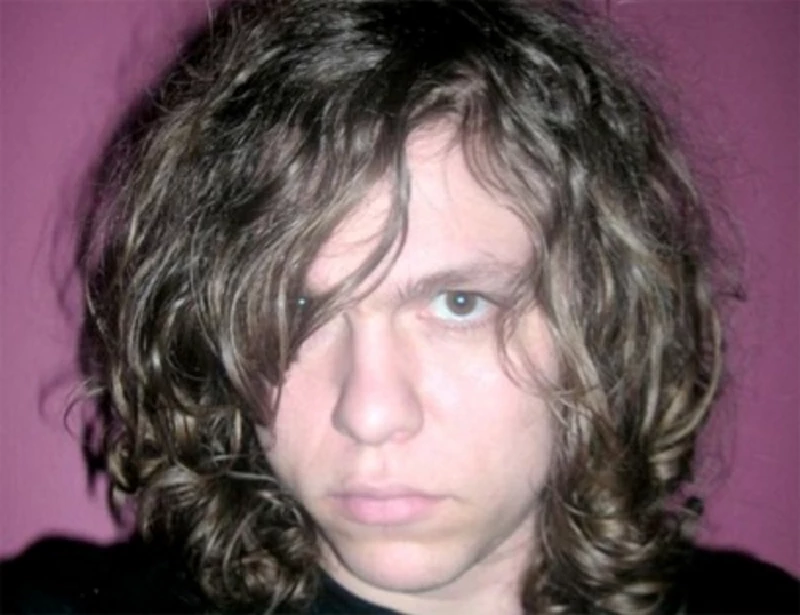
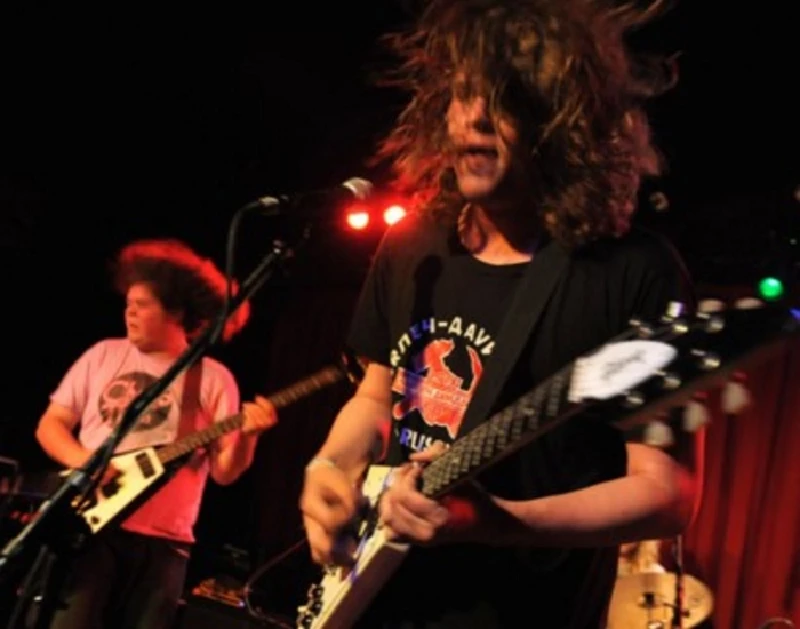
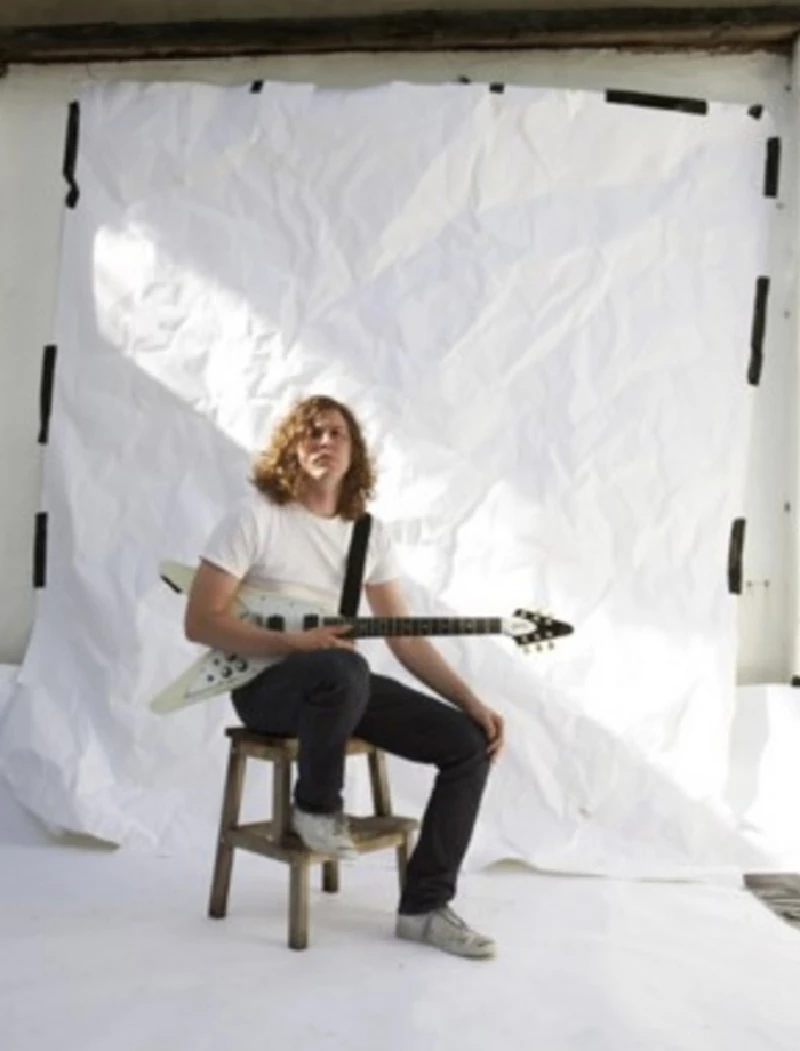
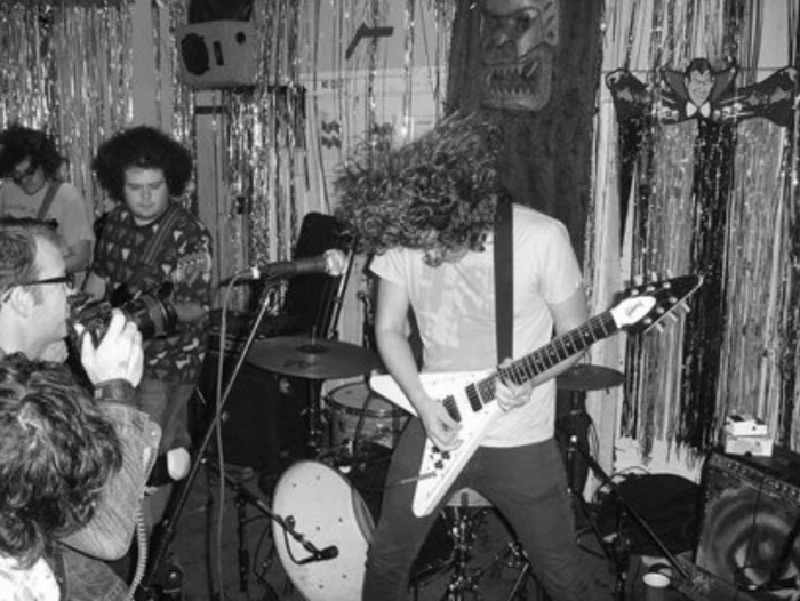
live reviews |
|
Babylon, Ottawa, 16/4/2008 |
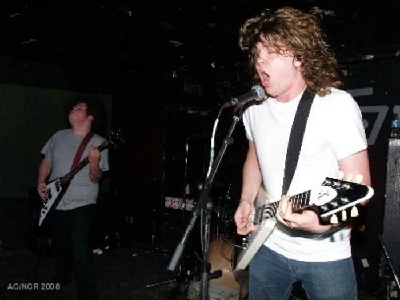
|
| Trash rocker Jay Reatard has a reputation for playing short, but chaotic gigs. Andrew Carver watches him deliver at all levels ina memorable show at the Babylon in Ottawa |
reviews |
|
Watch Me Fall (2009) |
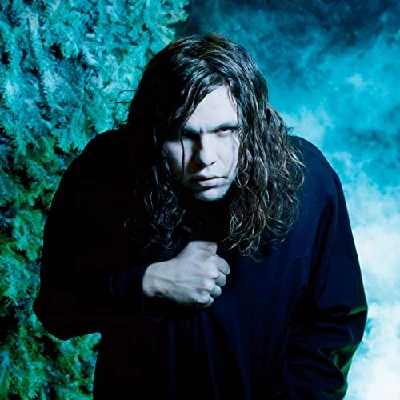
|
| Limited-in-vision old-style punk on latest album from Memphis-based singer and musician, Jay Reatard |
| Matador Singles '08 (2008) |
most viewed articles
current edition
Carl Ewens - David Bowie 1964 to 1982 On Track: Every Album, Every SongArmory Show - Interview with Richard Jobson
John McKay - Interview
Colin Blunstone - Thalia Hall, Chicago, 16/7/2025
Bathers - Photoscapes 1
Billie Eilish - O2 Arena, London, 10/7/2025
Loft - Interview
Visor Fest - Valencia, Spain, 26/9/2025...27/9/2025
Sir Tim Rice - Interview
Robert Forster - Interview
previous editions
Heavenly - P.U.N.K. Girl EPManic Street Preachers - (Gig of a Lifetime) Millennium Stadium, Cardiff, December 1999
Beautiful South - Ten Songs That Made Me Love...
Peter Perrett - In Dreams Begin Responsibilities Interview Part One
Boomtown Rats - Ten Songs That Made Me Love....
Oasis - Oasis, Earl's Court, London, 1995
Coldplay - Wembley Arena. London, 16/8/2022
Prolapse - Interview
Trudie Myerscough-Harris - Interview
Pixies - Ten Songs That Made Me Love...
most viewed reviews
current edition
Davey Woodward - Mumbo in the JumboSick Man of Europe - The Sick Man of Europe
Lucy Spraggan - Other Sides of the Moon
Blueboy - 2
Suzanne Vega - Flying With Angels
Bush - I Beat Loneliness
Amy Macdonald - Is This What You've Been Waiting For?
Phew, Erika Kobayashi,, Dieter Moebius - Radium Girls
Alice Cooper - The Revenge of Alice Cooper
Cynthia Erivo - I Forgive You
Pennyblackmusic Regular Contributors
Adrian Janes
Amanda J. Window
Andrew Twambley
Anthony Dhanendran
Benjamin Howarth
Cila Warncke
Daniel Cressey
Darren Aston
Dastardly
Dave Goodwin
Denzil Watson
Dominic B. Simpson
Eoghan Lyng
Fiona Hutchings
Harry Sherriff
Helen Tipping
Jamie Rowland
John Clarkson
Julie Cruickshank
Kimberly Bright
Lisa Torem
Maarten Schiethart